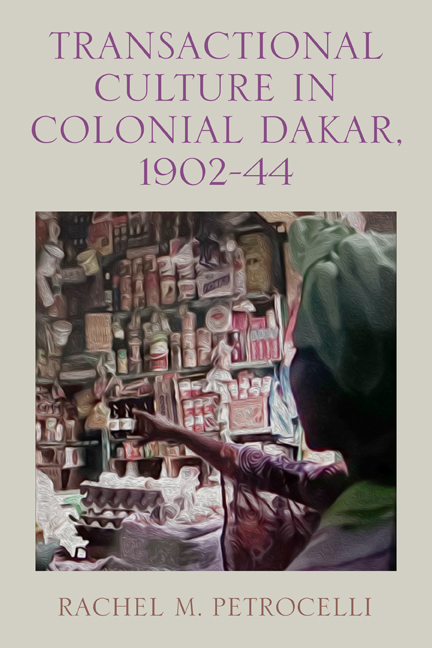Book contents
- Frontmatter
- Dedication
- Contents
- List of Illustrations
- Acknowledgments
- Introduction
- 1 Illusory Roots: Europeans, Autochthony, and Visions of a Capital City
- 2 The Rhetoric of Refoulement in Colonial Dakar
- 3 Challenges and Solutions of the Transient City
- 4 Impediments and Ingenuity in Financial Life
- 5 Ethnic Boundaries, Economic Niches, and Ambiguities in the Colonial City
- 6 The Lebanese and the Local in the Interwar Period
- 7 War’s Window: Urban Informality and Control
- Epilogue
- Bibliography
- Index
5 - Ethnic Boundaries, Economic Niches, and Ambiguities in the Colonial City
Published online by Cambridge University Press: 08 May 2024
- Frontmatter
- Dedication
- Contents
- List of Illustrations
- Acknowledgments
- Introduction
- 1 Illusory Roots: Europeans, Autochthony, and Visions of a Capital City
- 2 The Rhetoric of Refoulement in Colonial Dakar
- 3 Challenges and Solutions of the Transient City
- 4 Impediments and Ingenuity in Financial Life
- 5 Ethnic Boundaries, Economic Niches, and Ambiguities in the Colonial City
- 6 The Lebanese and the Local in the Interwar Period
- 7 War’s Window: Urban Informality and Control
- Epilogue
- Bibliography
- Index
Summary
Urban Spaces and Selves: The Cape Verdean Community of Dakar
Urban life in colonial Africa involved forging selves and opportunities. Carving out economic spaces in which to operate was critical to the task. In a colonial context that foregrounded questions of race and identity, deployment of those concepts was inherent to the process of creating and maintaining economic opportunities. The jobs people occupied were significant motors of urban growth, and the holders of a vast number of such jobs were not autochthonous Dakarois. In the capital of FWA, wage earners and merchants came not only from Senegal and the larger colony but from other colonies, particularly the nearby Portuguese holdings, and from other zones of French control, such as Syria and Lebanon. Whereas those from Senegal and its region often built Dakar into a wider network of geographies of work and residence, those from Portuguese colonies and the Levant were immigrants whose intent was to stay. In many ways, the creation of permanent immigrant communities in Dakar stood in contrast to the city's tendency toward transience while contributing to the expansion of the city through the arrivals of people from elsewhere.
The transactional culture of colonial Dakar relied on factors such as proximity, origin, trust, opportunity, movement, and flexibility, and communities coalesced around those. It also was shaped by the attitudes and actions of the colonial state. Cape Verdean success in Dakar has much to reveal about colonial urban niche economies and the dynamics of categorization that existed under colonialism. Most important is the simultaneous prominence and pliability of colonial exercises in identity definition. In his study of colonial Dar es Salaam, James Brennan has pointed to a “particular ambivalence at the heart of British interwar policy” as pertained to understanding what the colonial state perceived as native and nonnative identity categories. He argues that application of categories was neither consistent nor well defined and that “the process of identity formation had multiple if unequal participants” whose motivations varied in nature. The dynamic he describes was present across colonial contexts as the very act of seeking to know, define, and control identity was one that could only be fraught with assumptions and unintended consequences. Steven Fabian argues that the specificity of place is a significant factor to consider in any analysis of urban identity formation and self-perception.
- Type
- Chapter
- Information
- Transactional Culture in Colonial Dakar, 1902-44 , pp. 104 - 128Publisher: Boydell & BrewerPrint publication year: 2024

